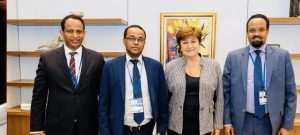Failed financial discussion between Ethiopia and the IMF
The realm of international finance, negotiations between nations and the International Monetary Fund (IMF) are pivotal moments that can shape the economic future of a country. Ethiopia, a nation with a rich history and a dynamic economy,has recently found itself at a crossroads in its discussions with the IMF.
Background of the Negotiations
The IMF staff, led by Mr. Alvaro Piris, concluded their mission to Ethiopia without reaching an agreement. This visit, which took place from March 19 to April 2, 2024,was aimed at discussing the Ethiopian authorities’ request for IMF support for their reform program. The mission was a follow-up to earlier discussions and was supposed to establish how the IMF could support Ethiopia’s economic program
Progress and Challenges
Despite the lack of a final agreement, the IMF team made substantial progress in understanding the Ethiopian authorities’ economic program and discussing potential support . The discussions are set to continue at the IMF/World Bank Spring Meetings later this month.
The IMF team acknowledged the significant steps Ethiopia has taken to bring down inflation and stabilize the economy, including fiscal and monetary tightening. These efforts are part of Ethiopia’s Homegrown Economic Reform Agenda,which aims to fulfill the country’s considerable economic potential. However, the stalemate in negotiations raises questions about the future of Ethiopia’s economic reforms and the role of the IMF in supporting them. The IMF’s press release on April 2, 2024, indicated that while the mission did not result in a Board discussion, there is still room for continued dialogue. The Ethiopian government’s commitment to reform and the IMF’s willingness to support these efforts suggest that an agreement could still be within reach.

Looking Ahead As Ethiopia and the IMF resume their discussions, the international community watches with keen interest. The outcome of these negotiations will not only affect Ethiopia’s economic trajectory but also serve as a benchmark for other nations seeking IMF support. The hope is that both parties will find common ground and pave the way for a prosperous and stable economic future for Ethiopia.
The IMF’s Stance the IMF has recognized Ethiopia’s request for financial support, which aims to address critical issues such as food security, humanitarian needs, and high inflation, while also supporting domestic economic reforms. However, despite a series of discussions and visits by IMF representatives to Addis Ababa, a consensus has yet to be reached.The Current Status as of the latest reports, the two-week round of discussions between Ethiopian officials and an IMF delegation in Addis Ababa has concluded
without reaching a financial package deal.
This development has raised questions about the next steps and the potential impact on Ethiopia’s economic recovery.Looking Forward the path ahead for Ethiopia remains uncertain. The nation’s economic stability hinges on the successful resolution of these negotiations. With the IMF indicating that discussions will continue at the upcoming IMF/World Bank Spring Meetings. there is hope for progress.
The international community and Ethiopia eagerly await a resolution that will pave the way for economic recovery and growth.The negotiations between Ethiopia and the IMF represent a critical juncture for the country. While the current impasse is a setback, it is not the end of the road. With continued dialogue and a mutual commitment to economic stability and growth, there is optimism that an agreement beneficial to both Ethiopia and the IMF can be reached.